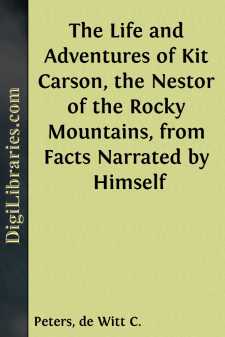History
- Africa 30
- Americas (North Central South West Indies) 50
- Ancient 68
- Asia 58
- Australia & New Zealand 8
- Canada 41
- Caribbean & West Indies 1
- Civilization 20
- Eastern Europe 12
- Europe 310
- Expeditions & Discoveries 60
- General 77
- Historical Geography 1
- Jewish 9
- Latin America 3
- Medieval 8
- Middle East 13
- Military 248
- Revolutionary 8
- Study & Teaching 5
- United States
- Western Europe 56
- World 13
United States Books
Sort by:
CHAPTER I INTRODUCTORY Everybody who reads this book through will wonder that a man who ought to be able to tell so much has really told so little. I have known personally and quite intimately, or have known intelligent and trustworthy persons who have known personally and quite intimately, many men who have had a great share in the history of this country and in its literature for a hundred and thirty...
more...
by:
Edward Duffy
During the latter part of October, 1862, negotiations were made by which the 167th Regiment, Colonel Homer A. Nelson, in Camp at Hudson, was consolidated with the 159th Regiment, Lieutenant-Colonel Edward L. Molineux, in camp at Brooklyn. The consolidated Regiment was designated the 159th, Colonel Nelson retaining command. The Regiment left "Camp-Kelly," Hudson, on the 30th day of October,...
more...
by:
John Bates Clark
It is currently reported that the late King Edward once said, "We are all Socialists, now": and if the term "Socialism" meant to-day what His Majesty probably meant by it, many of us could truthfully make a similar statement. Without any doubt, we could do so if we attached to the term the meaning which it had when it was first invented. It came into use in the thirties of the last...
more...
The publication at this time of a speech of the Presidential Canvass of 1860, may seem uncalled for, and be imputed to other than the motives that influence me. I nevertheless submit it to the candid consideration of the public, and especially of such as having heretofore entertained wrong views on the chief question involved in the canvass of 1860 and the position of the lamented Douglas, may desire...
more...
CHAPTER I. Carson's Birthplace—His Emigration to Missouri—Early Prospects—Is an Apprentice—Stories of the Rocky Mountains—He Enlists to go there—Adventures on the Prairies—Broaders is Wounded—Carson's Nerve put to the Test—Rude Amputation—Safe Arrival at Santa Fé—Goes to Taos and learns the Spanish Language—Early Vicissitudes—Disappointment and Attempt to return to...
more...
Life of Rear Admiral John Randolph Tucker A SKETCH OF THE AUTHOR. JAMES HENRY ROCHELLE, the author of the following pages, and the subject of this sketch, was of French-English and Celtic, or Scotch-Irish, extraction—English through his paternal great-grandmother, who was the daughter of Hinchia Gilliam, and his wife (née) Harrison; Scotch-Irish through his maternal ancestry. The name itself...
more...
Our defeat of Great Britain in the Revolutionary War was conclusive; though "we" in that case included France, without whose aid the patriots must have been defeated. It is not so easy to discover a fund of military glory in the War of 1812. That was a great war year. Within a few days of the declaration of war by the United States against Great Britain, Napoleon's Grand Army of over...
more...
A SKETCH. Fellows of the Association: In the endeavor to chronicle the lives and achievements of Kentucky Pioneers in Surgery, I shall not attempt the resurrection of village Hampdens or mute inglorious Miltons. The men with whom I deal were men of deeds, not men of fruitless promise. It may with truth be said that from Hippocrates to Gross few in our profession who have done enduring work have lacked...
more...
LOVING'S BEND From San Antonio to Fort Griffin, Joe Loving's was a name to conjure with in the middle sixties. His tragic story is still told and retold around camp-fires on the Plains. One of the thriftiest of the pioneer cow-hunters, he was the first to realize that if he would profit by the fruits of his labor he must push out to the north in search of a market for his cattle. The Indian...
more...
INTRODUCTION I purpose telling you in the following pages about the exploits of the gallant men who composed the American Navy, beginning with the Revolution and ending with the story of their wonderful deeds in our late war with Spain. You can never read a more interesting story, nor one that will make you feel prouder of your birthright. While our patriot armies have done nobly, it is none the less...
more...











